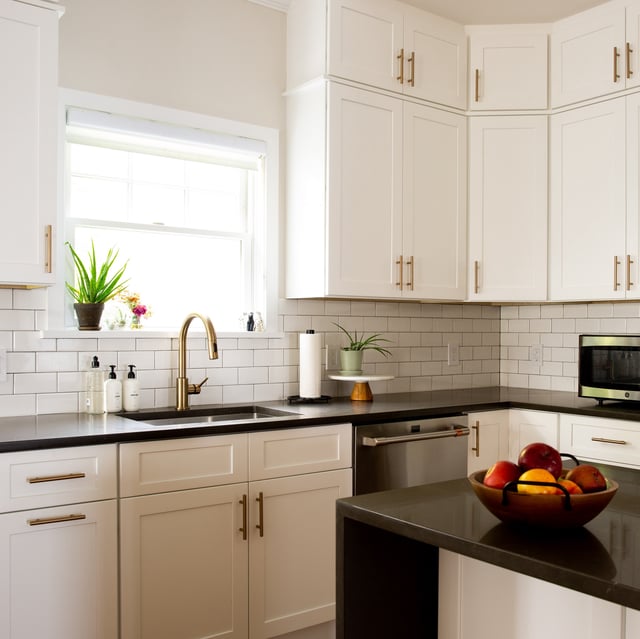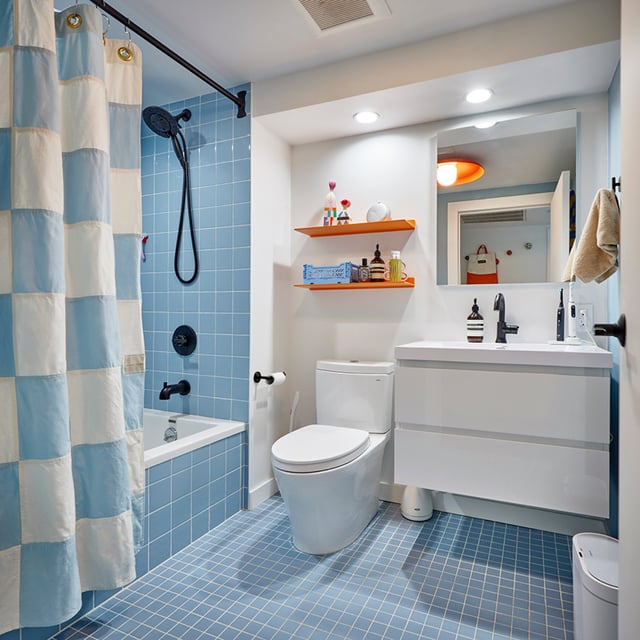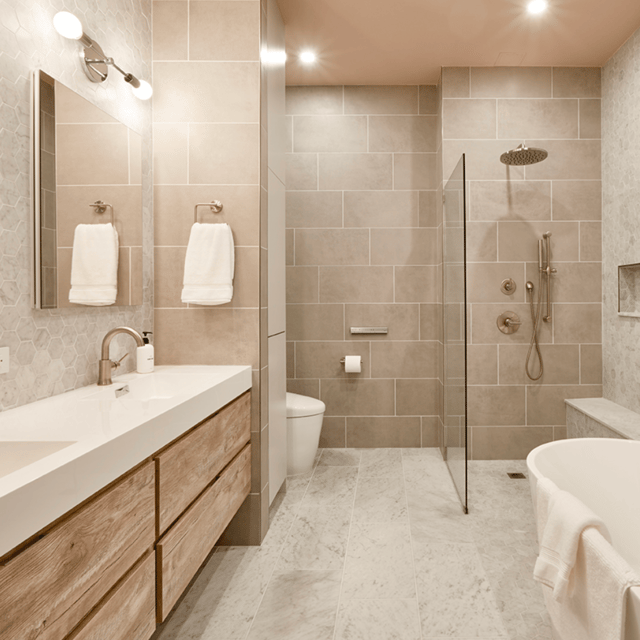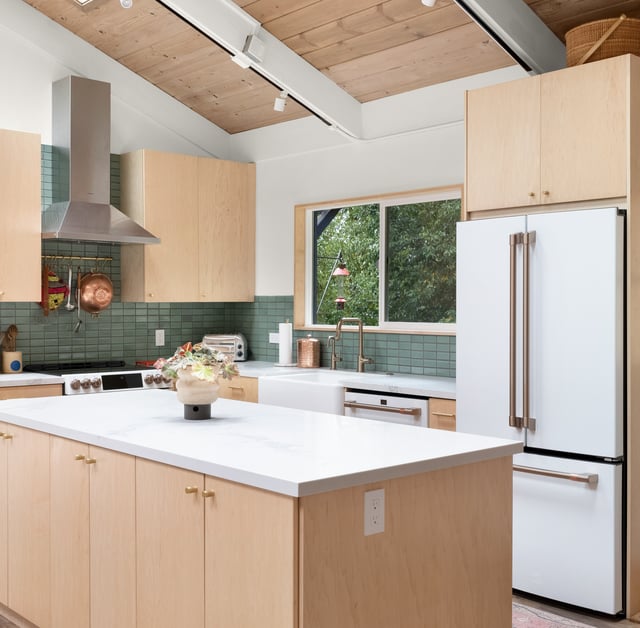
Kitchen
How Long Does a Kitchen Remodel Take?
04.01.2025

In This Article
Renovating in New York City is like starring in your own reality show—equal parts drama, unexpected twists, and the occasional triumph. But instead of a camera crew, you've got your contractor on speed dial and your building's board scrutinizing your every move. Welcome to the high-stakes world of NYC condo renovations and co-op board approval.
Sure, sprucing up your kitchen or upgrading your bathroom sounds straightforward. But in the city that never sleeps, even hanging a picture frame can turn into a production. Between navigating strict building rules, deciphering the NYC renovation process, and getting those all-important board approvals, the whole ordeal can feel like applying to college—except this time, your dream school is your dream home, and the admissions committee (aka your co-op board) might just reject your countertops.
The real kicker? It's not just about choosing the right shade of subway tile or debating quartz vs. marble. It's also about understanding the fine print of alteration agreements, timing your construction to avoid upsetting neighbors, and somehow surviving the endless parade of paperwork.
Renovating in a condo or co-op isn't for the faint of heart, but it doesn't have to be a nightmare. With a little planning, a lot of patience, and a solid understanding of how the process works, you'll be well on your way to turning that fixer-upper into your dream home—without alienating your building's board.
Renovating in NYC isn't just about picking the perfect subway tile or finally saying goodbye to that avocado-green bathroom from the '70s. It's about navigating a complex web of rules, regulations, and—if you're in a co-op—opinions. Before thinking about swinging a hammer, you need to understand the basics. That starts with knowing the difference between condos and co-ops and why board approval is the name of the game.
If you're new to NYC real estate, here's the lowdown: owning a condo is more straightforward. When you buy a condo, you own your unit outright, giving you more control over renovations. Want to knock down a wall? You'll likely need building management's approval, but you're usually good to go as long as it's not a load-bearing structure or violating the building's rules.
Co-ops, on the other hand, are an entirely different story. Instead of owning your unit, you own shares in the corporation that owns the building. Your living space is technically "yours," but any changes—even ones as small as switching light fixtures—usually require board approval. Co-op boards have stricter rules because they're not just overseeing a building but managing the collective interests of all the shareholders (your neighbors).
Ultimately, condos offer a bit more freedom, while co-ops tend to micromanage. Both require compliance with building regulations, but co-op boards often take it to the next level with their requirements for renovation plans, detailed applications, and, yes, lots of patience on your part.
So, why does your building care so much about your kitchen upgrade? The short answer: to protect the building. The long answer: to maintain structural integrity, preserve aesthetic consistency, and keep peace among neighbors. These rules, outlined in your building's alteration agreement and house rules, exist to ensure renovations don't disrupt the building's function or everyone's sanity.
In a co-op, the board's role is to oversee any changes that might impact other units or the property's overall value. For example, they'll want to ensure your new flooring won't echo like a drumbeat in the unit below. And in both condos and co-ops, there are strict guidelines around safety—renovations must meet building codes and sometimes require permits, like electrical or plumbing authorizations.
Before starting your project, get familiar with your building's alteration agreement and house rules. These documents will outline what's permissible, what permits are required, and whether there are restrictions on working hours or noise levels. Some boards may even require you to use specific materials to maintain uniformity.
It's a lot, but understanding these rules is crucial. Following them not only speeds up the approval process but also keeps your renovation on good terms with your board and neighbors. The process may seem overwhelming, but with proper planning and clear communication, you'll be one step closer to your dream home—minus the neighbor complaints.
When it comes to NYC renovations, getting board approval is a rite of passage. It's less "dream home" and more "prove you're not going to knock down the wrong wall." But don't worry—this guide will help you tackle the prep work like a pro.
Before you even think about presenting your renovation dreams to the board, you need a game plan. Step one? Hire the right people. NYC boards love licensed professionals—architects and contractors who know the city's strict building codes and how to navigate the infamous alteration agreement NYC process. Sure, your cousin who "watched a lot of HGTV" might offer to help, but trust us, leave it to the pros.
Once your team is assembled, it's time to develop a detailed renovation proposal NYC boards will love. This isn't just a list of "new floors, fresh paint, done." Boards want specifics: drawings, floor plans, and material lists. They want to know exactly what you're changing, why you're changing it, and how it'll affect the building. Think of it as giving your renovation project a résumé—and the board is your tough interviewer.
Speaking of résumés, you'll need to submit a hefty stack of documents alongside your proposal. Here's a quick rundown of what most boards will ask for:
These documents aren't just red tape; they show the board you've done your homework and aren't about to turn the building into a construction site free-for-all.
The more organized you are, the better. Double-check every form, signature, and permit before submitting your application. A small mistake can send your proposal back to square one—and no one wants that.
And remember, boards love communication. If they ask for revisions, be prompt and professional. It's all part of proving you're a responsible neighbor, not someone who's going to host midnight power tool parties.
While the process can feel like jumping through flaming hoops, it's worth it. With the right prep, you'll get the green light from the board and kick off your renovation with confidence—and maybe even a little peace of mind.
Renovating in NYC? Get ready to impress a very discerning audience: your condo or co-op board. Securing approval isn't just about showing off your great taste—it's about proving you won't accidentally turn the building into a construction nightmare. Here's how the NYC board approval for renovations process unfolds.
Step 1: Initial proposal submission
First things first, you'll submit your renovation proposal to the board or building management. This is where all your hard work—detailed plans, contractor credentials, and insurance certificates—pays off. Think of this as your opening act: you're laying out everything you plan to do, from repainting the walls to adding those dream custom cabinets.
Step 2: Board review and feedback
Once your proposal is in, the board will take their time (and by time, we mean time). They'll review every detail and may come back with questions or requests for changes. Maybe they're worried your flooring will amplify the sound of your dog's tap-dancing routine, or they want assurances your contractor won't disrupt the building's water supply. Whatever it is, be prepared to tweak your plans to keep everyone happy.
Step 3: Possible meeting with the board or management
In some cases, the board might ask to meet with you. Don't panic—this is your chance to charm them and reassure them that your renovation won't turn the building into a construction zone from a reality TV show. Be polite, clear, and confident. A little humor never hurts, but maybe leave the construction puns at home.
Step 4: Final approval
After the board has reviewed everything and you've made any necessary adjustments, they'll (hopefully) issue the final approval. This may come with conditions like limiting work hours or requiring additional insurance. Once you've met those requirements, you'll officially have the green light to start your project. Cue the confetti—or at least a celebratory coffee.
Here's where things get interesting: timing. The co-op renovation process NYC boards require can feel like waiting for your favorite band to drop a new album—long and unpredictable. Co-op boards are famously meticulous, and the process can take anywhere from a few weeks to a few months, depending on the scope of your project and how often the board meets.
Condos tend to be quicker but don't expect a lightning-fast turnaround. While they usually have fewer layers of approval, the process can still take several weeks. Pro tip: Submit everything as accurately and completely as possible to avoid unnecessary delays.
The board approval process might not be glamorous, but it's a crucial step toward creating your dream home. Stay organized, stay patient, and keep reminding yourself that it'll all be worth it when you're sipping coffee in your newly renovated kitchen. Even if it took a little longer than you hoped.
Renovating in NYC means you're not just battling outdated decor—you're also taking on a building board with plenty of opinions. Boards love to throw up roadblocks, but with a little know-how (and a lot of patience), you can navigate their objections like a pro. Let's break down the common challenges and how to overcome them.
If you think your co-op or condo board is laser-focused on your backsplash choice, think again. Their objections usually fall into three categories:
When objections arise, don't panic. Boards aren't out to ruin your dream home—they just want to make sure the renovation is smooth and drama-free (for them, at least). Here's how to handle their concerns:
The best way to avoid challenges is to work with a contractor who is already dancing this dance. Experienced NYC contractors know the drill (pun intended) regarding board approvals. They've seen the objections, addressed the concerns, and survived to tell the tale.
A seasoned pro will help you prepare detailed renovation plans, anticipate potential objections, and attend board meetings if needed. They'll also ensure all work complies with NYC building codes and your building's specific rules. Plus, they'll save you from accidentally submitting something that screams "rookie mistake."
NYC renovations come with their fair share of challenges, but they're not impossible. By understanding typical objections, addressing them head-on, and hiring an experienced contractor, you can turn your board from skeptical to satisfied—and finally get started on that dream home.
Renovating in NYC? Welcome to the Hunger Games of home improvement, where your condo or co-op board is the Capitol, and you're trying to stay in their good graces. But don't worry—with the right approach, you can make the process (almost) painless. Here are some tips to keep things smooth and drama-free.
Do: Treat your board like the gatekeepers they are. Submit everything they ask for—down to the last insurance certificate and contractor credential. Being thorough shows, you're serious and respectful of their rules.
Don't: Act like you're above the rules. Boards love order, and they've seen every excuse in the book. Trying to skirt around their processes will only earn you side-eyes—and delays.
Do: Be polite and patient. Even if their questions feel excessive ("Do you really need that sink?"), keep your cool. Remember, you're playing the long game.
Don't: Be vague about your plans. Boards want details, not vague promises. "A little kitchen upgrade" won't cut it. Lay out your vision clearly—blueprints and all.
Good communication is the secret sauce of a successful renovation. Start by being proactive: reach out to your board or management early to understand their requirements. This is also the time to ask about deadlines and any specific quirks in the building's approval process.
Once you've submitted your proposal, stay available. Boards appreciate applicants who are quick to respond to questions or requests for revisions. And while it's tempting to fire off a snarky email about their 12-page noise policy, take the high road. Diplomacy wins approvals.
If there's a meeting with the board, treat it like a job interview. Be professional, bring all necessary documentation, and prepare to answer questions. Even if it feels like they're grilling you, this is your chance to showcase how thoughtful and organized you are.
Here's the thing about renovations in NYC: delays are as inevitable as a subway train running late. Boards don't always meet when you want them to, and approvals can drag on longer than you'd hoped. That's why flexibility is key.
If the board requests changes to your plans, don't dig in your heels. Adjustments are part of the game, and showing you're willing to compromise goes a long way. Similarly, pad your timeline with a few extra weeks (or months) to account for the back-and-forth approval process.
Remember, the goal isn't just to get your renovation done—it's to do it in a way that doesn't alienate your neighbors or your board. A little patience and flexibility now will save you a lot of headaches later.
Navigating the approval process may not be fun, but with these tips, it doesn't have to be a nightmare. Stay polite, stay organized, and stay flexible. Before you know it, you'll be sipping coffee in your beautifully renovated kitchen, wondering why you were so stressed in the first place.
Renovating in NYC isn't just about picking the perfect tile or arguing with your contractor about grout colors—it's also a deep dive into the legal and financial fine print. Before you get too excited about your Pinterest-perfect plans, let's talk about the not-so-glamorous side of things.
If you thought renovations were expensive, wait until you see the price tag on the approval process. Condo and co-op boards don't just ask for your plans; they also want a slice of your budget. Be prepared for application fees, which can range from a few hundred dollars to over a thousand. And don't forget deposits—often required to cover any potential damage to common areas during construction. If your contractor so much as scratches the elevator, you might be kissing that deposit goodbye.
Then there are legal fees. Some boards will pass along the cost of their attorney reviewing your application because they need to ensure your bathroom remodel isn't a threat to the building's structural integrity. Add it all up, and you're looking at a few extra zeros on your renovation budget before any work even begins.
Here's some good news: you have rights as a unit owner! Boards can't just deny your renovation plans because they don't like your taste in wallpaper. Their objections need to be tied to legitimate concerns, like structural safety, noise, or building aesthetics.
Your building's alteration agreement outlines the rules and boundaries for renovations. Read it carefully—it's basically your renovation Bible. It spells out what's allowed, what's not, and what hoops you need to jump through to get your project approved. If you feel like the board is overstepping or dragging their feet unnecessarily, you can (politely) push back.
If you're knee-deep in paperwork and starting to feel like you're on an episode of Law & Order: Renovation Unit, it might be time to call in reinforcements. An experienced real estate attorney can be a lifesaver when things get tricky.
Consult an attorney if:
Having legal support doesn't mean you're gearing up for a fight—it just ensures you understand your rights and obligations as a unit owner. Plus, it's nice to have someone on your side when the board's requests start feeling a little… excessive.
The legal and financial side of NYC renovations might not be glamorous, but it's essential. By understanding the costs, knowing your rights, and knowing when to call in an expert, you'll be better prepared to navigate the process—and stay one step closer to that dream home.
Renovating in NYC isn't for the faint of heart, but with the right prep and professional backup, it's absolutely doable—and, dare we say, worth it. From decoding your building's alteration agreement to assembling a dream team of licensed pros, success starts with being organized and ready to tackle any curveballs your board throws your way.
Sure, the process might feel like a never-ending episode of Renovation Survivor, complete with board meetings and a pile of paperwork. But remember: every application fee, timeline adjustment, and structural concern brings you one step closer to sipping coffee in your dream kitchen or finally ditching that outdated bathroom.
The secret? Preparation and patience. Know the rules, lean on experienced contractors, and don't be afraid to consult an attorney if the board seems a little too picky about your backsplash choice. And keep the big picture in mind—because, eventually, all the approvals, meetings, and emails will be behind you.
So, take a deep breath, roll up your sleeves, and confidently dive in. You've got this! And when your renovation is complete, you'll be left with a home that's not only more functional and beautiful but also a testament to your ability to tackle NYC's unique challenges like a pro. Now, start that process and get ready to impress your board—and yourself.
What is an alteration agreement, and why is it required?
How long does the board approval process usually take in NYC?
Can a board reject my renovation plans? If so, what can I do?
What are the costs associated with condo or co-op board approvals?
How do I find a contractor experienced with NYC board approvals?
What types of renovations typically require board approval?

Renovate confidently with Block
Easily compare quotes from top quality contractors, and get peace of mind with warranty & price protections.
Thousands of homeowners have renovated with Block

4.5 Stars (100+)

4.7 Stars (100+)

4.5 Stars (75+)

Kitchen
How Long Does a Kitchen Remodel Take?
04.01.2025

Remodeling
How to Renovate in New York City: A Complete Guide
03.19.2025

Remodeling
A Complete Guide to Bathroom Renovation Costs in Brooklyn
03.19.2025

Bathroom
A Complete Guide To New York City Bathroom Remodels
03.13.2025

Cost
How Much Does a Home Renovation Cost in the Bay Area?
03.13.2025
Renovate confidently